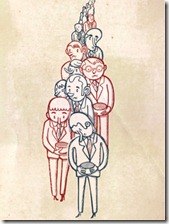
The new Saudi internet law has been in the backs of our heads for ages. Nothing really new about it for people who are used to risk the dangers between honest anonymity or timid exposure. The only difference is that, now that it's governed by law, we are more aware of the risks we take in our choice to (ab)use our freedom of speech.
First Choice
We can always revert to the byproduct of that freedom, the freedom to state the fifth: silence. Looking at the immense amount of monolog diarrhea that Saudi bloggers have abused in their blogs, it's actually a good thing that blogging is part of that new law. The world needs not another verbal vomitter, or another "how I spend my afternoon with my cats" post.
Then again, the law is mostly for those who want to be heard. Who need to be heard. Who choose to risk their personal safety and comfort to say the things they feel need to be said.
Freedom
Freedom, any kind of freedom, is a responsibility. Having laws to govern freedom may be a hassle, but it also reminds us just how big a responsibility this freedom carries. If all of us, bloggers-tweeps-writers are aware of that importance, we might treat that privilege with more reverence.
Responsibility
Public exposure results in public concern, and as far as governments are concerned, either delivered with appeasing promises or tyrannical threats, controlling the public behavior is any government's first job description.
The responsibility in speaking your mind (whether in public or with intimate friends) means that you are aware of the possible results that your words might take. That you bear the risks of getting responses from your audience. (Unless you're severely autistic, but I haven't seen many autistic bloggers of late. Have you?)
Now, people who do speak their minds, whatever responses they risks in saying them, are folks who are
- a) too pessimistic of immediate society's response to their words, (e.g. I don't want to marry my cousins, yumma.)
- b) desperate to have their words out there, (Don't marry your cousins, kids)
- c) aware of the importance of their arguments (Marrying close relatives might increase risks of genetic disorders)
Response
If people write in public, and I did say write, not just blurt vomits of unreasonable hate, then the weight of their words is multiplied by every reader. Think about it this way: a postcard from a beloved can uplift you or ruin your day. A tweet can save a life or destroy it. This blog has saved and ruined my reputation more times than I would like to admit.
Imagine if you're as hot and intelligently sexy as @Diana, @Soumz & @LamaSabri, or as provocative as the Big Daddy of Saudi Blogging. Oh the swooning hearts, oh the fallen temptations.
If you're a blogger
Be upset about the laws regulating the Saudi internet, that's fine. Just remember, if your thoughts are so important that you would risk your personal safety for it, then by all possible means have them said. (Pass them on to me, and I'll post them anonymously from my blog. Anything to rock your boat.)
But consider the risks you're taking to have these thoughts out there. Consider the people you are saving (yes, saving) or hurting by saying them. Consider your intent in spreading your ideas. Are you doing this for good cause or just anarchy? How much comfort can you afford risking by having your thoughts spoken publicly? Does your significant others support your ideas?
If you're a reader
Understand that no blogger sticks to their craft for the heck of it. Blogging starts from the heart, and goes back there. Consider that serious bloggers (folks who are risking their personal comforts to write publicly) are people fighting to be heard, hence worth listening to. They are striving for betterment, for change. They're writing for bigger sentimental gains: That this is what they think is right and honest and just.
And if they are swimming against the mainstream media, then there must be some sense in their work, for only few people are able to think out of the box, and even less dare to speak/write them out loud.
Writing from my tower of ivory freedom,
Hning a.k.a. Alia M. Makki
PS. Can't believe I'm breaking my blogging fast with a post on Speech! Civil rights, ya naas?! Get me something katkoot to chew on! #gnarfls





.JPG)
